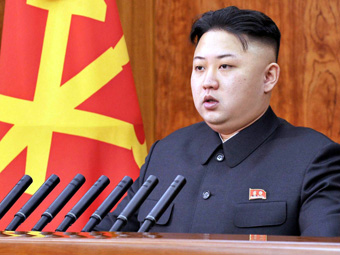
North Korea Changes Time Zones, Threatens War
| published August 16, 2015 |
By Thursday Review staff
North Korea’s Kim Jong-un and his media minions in Pyongyang have again ramped up their language to include the threat of outright war, including a specific threat to send waves of troops across the demilitarized zone along the 38th parallel.
The threats came after a particularly nasty war of words ensued over the last few days—the result of the maiming of two South Korean soldiers who stepped on landmines in the demilitarized zone and only a short walk from the South Korean checkpoint. Seoul has accused North Korea of deliberately planting the landmines near the South Korean side of the zone. Officials in Pyongyang have denied any such sabotage, and have called Seoul’s charge provocative.
In response, South Korea began using long-decommissioned loudspeakers along the border to send pro-South, pro-U.S. propaganda broadcasts toward North Korean troops and the civilians living in villages along the border. North Korea has demanded an immediate end to the loudspeaker broadcasts or it will initiate an “all-out war” on the South.
The escalation of words and the ramping up of military threats is not something new in the often tense, distrustful relationship that exists between the two Koreas. But this latest dustup comes, ironically, at a moment when both countries would ideally pause to honor a shared experience, one which impacted the lives of millions of Koreans in previous generations.
To commemorate the 70th anniversary of Korea’s liberation from their Japanese captors in the final days and weeks of World War II, both North and South Korea had agreed to engage in a variety of celebrations in their respective capital cities, and—possibly—along the border, specifically at Panmunjon, a village long ago abandoned as a residential town, but now the site of the so-called Joint Security Area, where officials of the North and South meet as needed to resolve problems or discuss military differences. Though only one small building remains of the original village—the building where the armistice was signed between North and South in 1953—other newer buildings have been constructed nearby, on each side of the border, and several which famously straddle the actual demarcation line.
Not surprisingly, however, officials neither Seoul nor Pyongyang were able to forge an agreement regarding a joint ceremony or any form of combined celebration to mark the end of Japanese occupation. North Korea, however, held mass celebrations inside the demilitarized zone—peaceful rallies which included music, flag-waving, synchronized movements, parades and other crowd spectacles. South Korean and American soldiers—along with a few other international observers and military representatives—watched from their side of the heavily fortified fence-line. Most of those who participated in the rallies and demonstrations within the DMZ were from outside the borders of the North—pro-Pyongyang groups and individuals flown-in for the occasion. Many others were members of highly select citizen groups loyal to the regime in North Korea.
As for the loudspeakers now blaring at the north, Pyongyang says it considers the broadcasting to be an act of war, and has demanded the speakers be turned off or its troops and artillery will attack the areas where the loudspeakers are in use. North Korea has said that the evidence regarding the placement of landmines is phony—cooked up to stir anger at the North.
North Korea celebrated its independence from outside powers by declaring itself a part of a new time zone, one which it calls Pyongyang Time. Previously, both North and South Korea have been in the same time zone as Tokyo and most of Japan. North Korea made the switch at midnight on August 15, signaling the conversion with bells ringing and fireworks displays, and declaring that the time zone change was its essential last break with its former colonial masters of Imperial Japan.
North Korea is now 30 minutes behind its neighbors in South Korea and Japan, and 30 minutes ahead of its neighbors to the north and west—China and Russia.
Related Thursday Review articles:
Top North Korean Official Executed; Thursday Review staff; Thursday Review; May 13, 2015.
North Korea Issues Threat Against U.S. Ambassador; Thursday Review; April 17, 2015.
